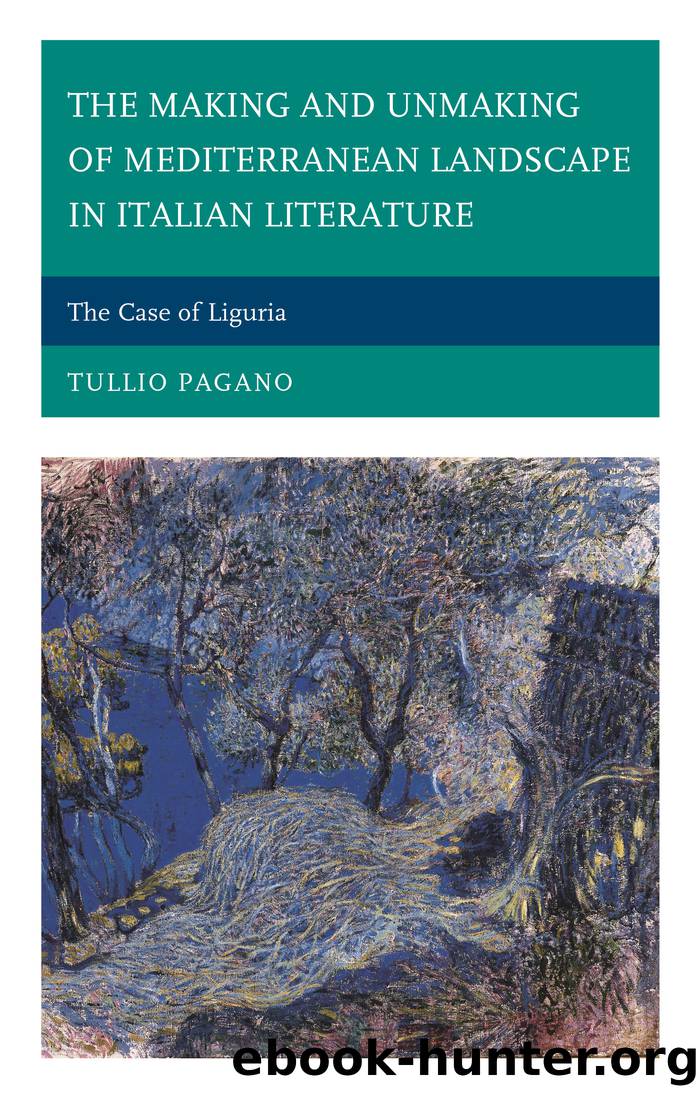The Making and Unmaking of Mediterranean Landscape in Italian Literature by Pagano Tullio;

Author:Pagano, Tullio;
Language: eng
Format: epub
Tags: undefined
Publisher: Fairleigh Dickinson University Press
Published: 2012-08-15T00:00:00+00:00
Caproni studied violin at the Genoa Conservatory and began playing both in local dance halls and opera houses. When he was only eighteen, he was called upon to replace the first violinist in Massenetâs opera Thais. The overwhelming emotion he experienced made him realize that he could not become a professional musician. Thus, poetry became âun surrogato per la musica traditaâ [a surrogate for the music I betrayed] (LI). Giuseppe Ungarettiâs brief and incisive verses had a profound impact on him, as displayed in his first poetic compositions. He also read the poets associated with the literary journal Riviera Ligure, but the most influential book was Ossi di seppia, which he read in 1930 for the first time. Montaleâs poetry became âparte inseparabile del mio essere, alimento e sangue della mia vitaâ [inseparable part of my being, nourishment, and blood of my life] (LII). Caproni began to write his own verses in the early 1930s, while completing his teacherâs degree. His first book, Come unâallegoria [As an Allegory], published in 1936, was dedicated to Olga Franzoni, his fiancée, who had died earlier the same year. The bookâs dedication read: âAllâumiltà sorridente / della mia piccola Olga Franzoni / amata e disperatamente / perduta, / queste âsueâ umili cose.â [To the smiling humbleness / of my little Olga Franzoni / loved and desperately / lost, / these humble things] (Surdich 32). This tragic event deeply marked Caproniâs vision of the world and consequently his early poetry, characterized, as Luigi Surdich put it, by a âdialettica di lieta espansività e di avvertenza della precarietà â [dialectic of happy expansiveness and an awareness of precariousness] (Surdich 32). This sense of lifeâs precariousness was accentuated by the events of World War II, transforming his youth into a period of âbianca e quasi forsennata disperazioneâ [white and almost frenzied desperation] (LVIII). A new relationship with Rosa Roccatagliata, whom he married shortly after Olgaâs death, and his love for poetry, helped make his life bearable at that time. Rosa was born in a small village in the Trebbia Valley, in the mountains behind Genoa, and it is through her that Caproni discovered the landscape of the Ligurian Apennines. This narrow, steep valley connects the region of Liguria with the Pianura Padana, the Po Valley. This is where the poet taught elementary school for several years, met his wife and fought as a partisan during the Resistance. It also is where he spent the summers throughout his life. The windy âStatale 45â [State Road 45] that appears in his poetic works, follows the course of the Bisagno and Trebbia rivers and ends near Piacenza, in Emilia Romagna.[3] The volume Ballo a Fontanigorda [Dance in Fontanigorda], one of his first collections of poetry, refers to a small town located along this road, in the upper Trebbia Valley.
In Caproniâs early poetry, the Ligurian countryside is perceived and represented in a sensuous way. The language he uses is simple, while the internal rhymes and alliterations manage to create an almost hypnotic effect on the reader.
Download
This site does not store any files on its server. We only index and link to content provided by other sites. Please contact the content providers to delete copyright contents if any and email us, we'll remove relevant links or contents immediately.
The Power of Myth by Joseph Campbell & Bill Moyers(1057)
Half Moon Bay by Jonathan Kellerman & Jesse Kellerman(979)
Inseparable by Emma Donoghue(976)
A Social History of the Media by Peter Burke & Peter Burke(976)
The Nets of Modernism: Henry James, Virginia Woolf, James Joyce, and Sigmund Freud by Maud Ellmann(893)
The Spike by Mark Humphries;(809)
The Complete Correspondence 1928-1940 by Theodor W. Adorno & Walter Benjamin(783)
A Theory of Narrative Drawing by Simon Grennan(775)
Culture by Terry Eagleton(770)
Ideology by Eagleton Terry;(733)
World Philology by(712)
Farnsworth's Classical English Rhetoric by Ward Farnsworth(711)
Bodies from the Library 3 by Tony Medawar(707)
Game of Thrones and Philosophy by William Irwin(707)
High Albania by M. Edith Durham(699)
Adam Smith by Jonathan Conlin(687)
A Reader’s Companion to J. D. Salinger’s The Catcher in the Rye by Peter Beidler(685)
Comic Genius: Portraits of Funny People by(649)
Monkey King by Wu Cheng'en(647)
